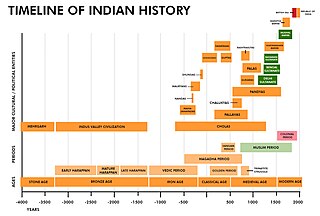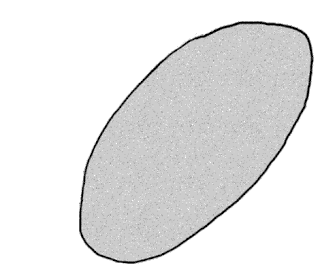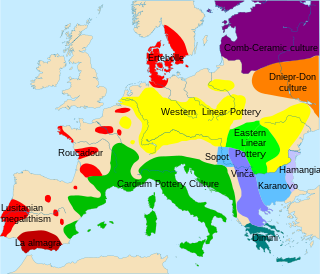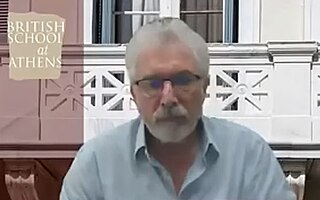Related Research Articles

This is a timeline of Indian history, comprising important legal and territorial changes and political events in India and its predecessor states. To read about the background to these events, see History of India. also see the list of governors-general of India, list of prime ministers of India and Years in India.

Dorothy Annie Elizabeth Garrod, CBE, FBA was an English archaeologist who specialised in the Palaeolithic period. She held the position of Disney Professor of Archaeology at the University of Cambridge from 1939 to 1952, and was the first woman to hold a chair at either Oxford or Cambridge.

The prepared-core technique is a means of producing stone tools by first preparing common stone cores into shapes that lend themselves to knapping off flakes that closely resemble the desired tool and require only minor touch-ups to be usable.

The South Asian Stone Age covers the Palaeolithic, Mesolithic and Neolithic periods in the Indian subcontinent. Evidence for the most ancient Homo sapiens in South Asia has been found in the cave sites of Cudappah of India, Batadombalena and Belilena in Sri Lanka. In Mehrgarh, in what is today western Pakistan, the Neolithic began c. 7000 BCE and lasted until 3300 BCE and the first beginnings of the Bronze Age. In South India, the Mesolithic lasted until 3000 BCE, and the Neolithic until 1400 BCE, followed by a Megalithic transitional period mostly skipping the Bronze Age. The Iron Age in India began roughly simultaneously in North and South India, around c. 1200 to 1000 BCE.
Frank Raymond Allchin, FBA was a British archaeologist and Indologist. He and his wife, Bridget Allchin, formed one of the most influential British partnerships in the post-Independence study of South Asian archaeology. Producing a large body of scholarship ranging from archaeological excavations, ethnoarchaeology as well as epigraphy and linguistics, the Allchins made their work and that of others accessible through a series of sole, joint and edited publications. Seminal works include The Birth of Indian Civilisation (1968), which was later superseded by their books The Rise of Indian Civilisation in India and Pakistan (1982) and The Archaeology of Early Historic South Asia (1995).

The Karanovo culture is a Neolithic culture named after the Bulgarian village of Karanovo. The culture, which is part of the Danube civilization, is considered the largest and most important of the Azmak River Valley agrarian settlements.

Prehistoric Asia refers to events in Asia during the period of human existence prior to the invention of writing systems or the documentation of recorded history. This includes portions of the Eurasian land mass currently or traditionally considered as the continent of Asia. The continent is commonly described as the region east of the Ural Mountains, the Caucasus Mountains, the Caspian Sea, Black Sea and Red Sea, bounded by the Pacific, Indian, and Arctic Oceans. This article gives an overview of the many regions of Asia during prehistoric times.
Riwat is a Paleolithic site in Punjab, northern Pakistan. Another site, called Riwat Site 55, shows a later occupation dated to around 45,000 years ago.
Bridget Allchin was an archaeologist who specialised in South Asian archaeology. She published books, some co-authored with her husband, Raymond Allchin (1923–2010).
Peter Dixon Hiscock is an Australian archaeologist. Born in Melbourne, he obtained a PhD from the University of Queensland. Between 2013 and 2021, he was the inaugural Tom Austen Brown Professor of Australian Archaeology at the University of Sydney, having previously held a position in the School of Archaeology and Anthropology at the Australian National University.

Marek Zvelebil, FSA (1952–2011) was a Czech-Dutch archaeologist and prehistorian.

Pakistan is home to many archaeological sites dating from Lower Paleolithic period to Mughal empire. The earliest known archaeological findings belong to the Soanian culture from the Soan Valley, near modern-day Islamabad. Soan Valley culture is considered as the best known Palaeolithic culture of Central Asia. Mehrgarh in Balochistan is one of the most important Neolithic sites dating from 7000 BCE to 2000 BCE. The Mehrgarh culture was amongst the first culture in the world to establish agriculture and livestock and live in villages. Mehrgarh civilization lasted for 5000 years till 2000 BCE after which people migrated to other areas, possibly Harappa and Mohenjo-daro. Harappa and Mohenjo-daro are the best known sites from the Indus Valley civilization.

The Mojokerto child, also known as Mojokerto 1 and Perning 1, is the fossilized skullcap of a juvenile early human. It was discovered in February 1936 near Mojokerto by a member of an excavation team led by Ralph von Koenigswald. Von Koenigswald first called the specimen Pithecanthropus modjokertensis but soon renamed it Homo modjokertensis because Eugène Dubois – the discoverer of Java Man, which was then called Pithecanthropus erectus – disagreed that the new fossil was a Pithecanthropus. The skullcap is now identified as belonging to the species Homo erectus.
Paul Barry Pettitt, FSA is a British archaeologist and academic. He specialises in the Palaeolithic era, with particular focus on claims of art and burial practices of the Neanderthals and Pleistocene Homo sapiens, and methods of determining the age of artefacts from this time. Since 2013, he has been Professor of Archaeology at Durham University. He previously taught at Keble College, Oxford and the University of Sheffield.

Robert G. Bednarik is an Australian prehistorian and cognitive archeologist.

Donald John Logan Bennet,, known as John Bennet, is a British archaeologist, classicist, and academic, who specialises in the Aegean civilisations. He has been Professor of Aegean Archaeology at the University of Sheffield since 2004, and was Director of the British School at Athens from 2015 to 2022. He previously taught at the University of Cambridge, the University of Wisconsin–Madison and the University of Oxford.
The Untermassfeld fossil site is a palaeontological site in Thuringia, Germany. Excavated continuously since its discovery in 1978, it has produced many fossils dating to the late Early Pleistocene or Epivillafranchian geologic period, approximately 1.2 – 0.9 million years before present (BP). Claims that hominins were also present at the site have sparked a major controversy.
Susan Sherratt is Reader in Mediterranean Archaeology at the University of Sheffield. Her research focuses on the archaeology of the Bronze and Early Iron Ages of the Aegean, Cyprus and the eastern Mediterranean, especially trade and interaction within and beyond these regions.
John C. Barrett, is a British archaeologist, prehistorian, and Emeritus Professor of Archaeology at the Department of Archaeology, University of Sheffield. His research has primarily focussed on archaeological theory, European Prehistory from early agriculture to Romanisation, and the development of commercially funded archaeology in the UK. Barrett has been seen as an influential figure in the development of archaeological theory, critiques of archaeological practice, and British Prehistory.
Barbara S. Ottaway is a British archaeologist. She was previously a Reader in Archaeology in the Department of Archaeology, University of Sheffield, and Professor in Archaeology at the University of Exeter. Her research primarily focusses on early copper metallurgy and the prehistory of central and south-eastern Europe. Ottaway has also written on her experiences growing up in Nazi-era Germany. She has been noted as an influential figure in the study of archaeometallurgy, metals analysis, and experimental archaeology.
References
- ↑ "Professor Robin Dennell". University of Exeter. Retrieved 25 September 2017.
- 1 2 3 4 "Professor Robin Dennell - Biography". University of Exeter. Retrieved 25 September 2017.
- ↑ Dennell, Robin (1978). Early Farming in South Bulgaria from the VI to the III Millennia B.C. British Archaeological Reports International Series 45. Oxford: Archaeopress. ISBN 9780860540212.
- ↑ "Professor Robin Dennell". British Academy. Retrieved 25 September 2017.
